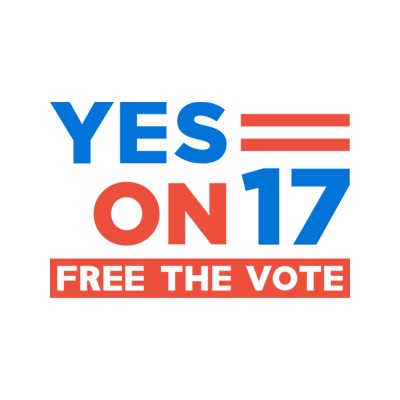Yes on Prop. 17
Civic Engagement Includes the Right to Vote

The concept of a democracy “of, by, and for” the people, rooted in the belief that all are created equal, has been a bedrock principle in America for more than two centuries. Regrettably, for much of our history, voting rights have been limited to a select few, with many Americans excluded on the basis of gender, race, or economic status. But every step we have taken toward equality and inclusion has provided us with a better society.
Next Tuesday, November 3, California voters have an opportunity to bring our state another step closer to our founding principles by welcoming 50,000 more Californians into mainstream democracy. Proposition 17 would amend the state Constitution to restore the right to vote to California citizens who have successfully completed their prison sentences and returned to society.
The two of us have spent decades working in law enforcement and the legal system — behind the bench of the Superior Court of Santa Barbara County, in the District Attorney’s Office, and managing operations and investigations for the FBI — and have sent many hundreds of people to prison. But, during that same time, we have also seen many people return home from prison. We’ve observed the tremendous challenges they face upon returning to the communities they left. The stigma that follows them is often insurmountable. Many potential employers won’t consider their job applications. Real estate agents and landlords are reluctant to broker leases. Lenders won’t approve loans. And, too frequently, society at large is very reluctant to acknowledge them as full citizens.
But the barriers we have erected for people returning from prison are often self-defeating and not serving their intended purpose. Rather than keeping us safe, they are simply preventing tens of thousands of Californians who have paid their debt to society from reintegrating into our communities.
Civic inclusion and engagement have repeatedly been shown to improve re-entry outcomes and to make our communities safer. Similarly, research consistently demonstrates that individuals who are accepted and valued as members of their local communities and feel that their voices matter are significantly more likely to lead productive and crime-free lives. Likewise, perceptions of government and respect for law enforcement improve when formerly incarcerated individuals’ rights are restored, and these improved perceptions keep our colleagues and our neighborhoods safer.
Over the past two decades, California has become a national leader in criminal justice reform — from reducing prison and jail overcrowding to proactively adjusting how we handle drug offenses and other nonviolent felonies. The state’s crime rates are at an all-time low — but we are still far behind other states in recognizing the value and importance of restoring the right to vote to those who have returned from prison.
Seventeen states automatically restore the right to vote for citizens who have completed their prison terms. Maine and Vermont never took voting rights away in the first place, and the District of Columbia recently restored voting rights to people in prison. But California’s law — a relic from the 19th century when many laws were designed specifically to exclude people from our democracy — remains in place.
Approval of Proposition 17 is critical to achieving the ideals our criminal justice system should pursue and to the futures of 50,000 of our family members, friends, neighbors, and coworkers who have completed their sentences and embarked on their uphill struggle to rebuild their lives.
With this election, California voters can uphold and bolster American ideals, enhance the safety of our communities, and make our democracy stronger by voting “yes” on Proposition 17. The history of this state and the American Constitution encourage it, and it is our duty as citizens to return fairness and equality to our system of justice.
Judge George Eskin (retired) of the Superior Court of Santa Barbara County also served as assistant district attorney in Santa Barbara and Ventura counties and as chief assistant city attorney for Los Angeles. Tom Parker was a 24-year FBI agent and retired as Assistant Special Agent in Charge of the FBI’s Los Angeles Field Office. He is a former fire and police commissioner for the City of Santa Barbara. Judge Eskin and Agent Parker are speakers for the Law Enforcement Action Partnership (LEAP), a nonprofit group of police, prosecutors, judges, and other law enforcement officials working to improve the criminal justice system.



